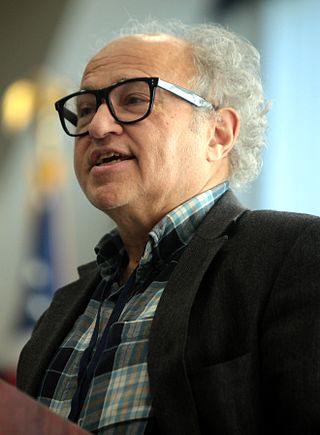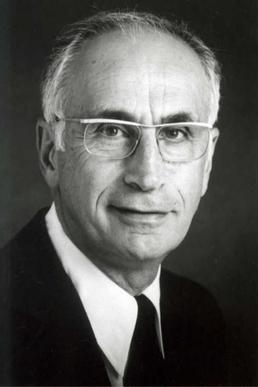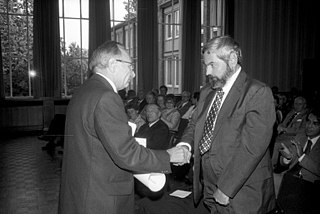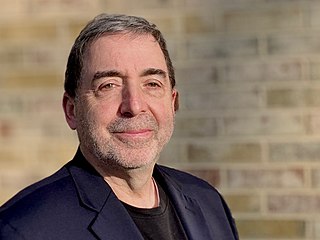
David Director Friedman is an American economist, physicist, legal scholar, author, and anarcho-capitalist theorist. Although he studied chemistry and physics and not law or economics, he is known for his textbook writings on microeconomics and the libertarian theory of anarcho-capitalism, which is the subject of his most popular book, The Machinery of Freedom. Described by Walter Block as a "free-market anarchist" theorist, Friedman has also authored several other books and articles, including Price Theory: An Intermediate Text (1986), Law's Order: What Economics Has to Do with Law and Why It Matters (2000), Hidden Order: The Economics of Everyday Life (1996), and Future Imperfect (2008).

Ronald Harry Coase was a British economist and author. Coase received a bachelor of commerce degree (1932) and a PhD from the London School of Economics, where he was a member of the faculty until 1951. He was the Clifton R. Musser Professor of Economics at the University of Chicago Law School, where he arrived in 1964 and remained for the rest of his life. He received the Nobel Memorial Prize in Economic Sciences in 1991.
Duncan Black, FBA was a Scottish economist who laid the foundations of social choice theory. In particular he was responsible for unearthing the work of many early political scientists, including Charles Lutwidge Dodgson, and was responsible for the Black electoral system, a Condorcet method whereby, in the absence of a Condorcet winner, the Borda winner is chosen.
Law and economics, or economic analysis of law, is the application of microeconomic theory to the analysis of law. The field emerged in the United States during the early 1960s, primarily from the work of scholars from the Chicago school of economics such as Aaron Director, George Stigler, and Ronald Coase. The field uses economics concepts to explain the effects of laws, to assess which legal rules are economically efficient, and to predict which legal rules will be promulgated. There are two major branches of law and economics; one based on the application of the methods and theories of neoclassical economics to the positive and normative analysis of the law, and a second branch which focuses on an institutional analysis of law and legal institutions, with a broader focus on economic, political, and social outcomes, and overlapping with analyses of the institutions of politics and governance.
The Chicago school of economics is a neoclassical school of economic thought associated with the work of the faculty at the University of Chicago, some of whom have constructed and popularized its principles. Milton Friedman, Thomas Sowell, and George Stigler are considered the leading scholars of the Chicago school.

Richard H. Thaler is an American economist and the Charles R. Walgreen Distinguished Service Professor of Behavioral Science and Economics at the University of Chicago Booth School of Business. In 2015, Thaler was president of the American Economic Association.

Herman Edward Daly was an American ecological and Georgist economist and professor at the School of Public Policy of University of Maryland, College Park in the United States, best known for his time as a senior economist at the World Bank from 1988 to 1994. In 1996, he was awarded the Right Livelihood Award for "defining a path of ecological economics that integrates the key elements of ethics, quality of life, environment and community."

Armen Albert Alchian was an American economist. He spent almost his entire career at the University of California, Los Angeles (UCLA). A major microeconomic theorist, he is known as one of the founders of new institutional economics and widely acknowledged for his work on property rights.
Steven E. Landsburg is an American professor of economics at the University of Rochester in Rochester, New York. From 1989 to 1995, he taught at Colorado State University. Landsburg is also an outspoken commentator on economic, legal, and political issues whose comments have sometimes been regarded as controversial.

Freakonomics: A Rogue Economist Explores the Hidden Side of Everything is the debut non-fiction book by University of Chicago economist Steven Levitt and New York Times journalist Stephen J. Dubner. Published on April 12, 2005, by William Morrow, the book has been described as melding pop culture with economics. By late 2009, the book had sold over 4 million copies worldwide. Based on the success of the original book, Levitt and Dubner have grown the Freakonomics brand into a multi-media franchise, with a sequel book, a feature film, a regular radio segment on National Public Radio, and a weekly blog.
Steven Ng-Sheong Cheung is a Hong Kong-born American economist who specializes in the fields of transaction costs and property rights, following the approach of new institutional economics. He achieved his public fame with an economic analysis on China open-door policy after the 1980s. In his studies of economics, he focuses on economic explanation that is based on real world observation. He is also the first to introduce concepts from the Chicago School of Economics, especially price theory, into China. In 2016, Cheung claimed to have written "1,500 articles and 20 books in Chinese" during his academic career.

Elizabeth Ellery Bailey was an American economist. She was the John C. Hower Professor of Business and Public Policy, at The Wharton School of the University of Pennsylvania. Bailey studied deregulation, market competition and regulatory capture through her career and contributed to the deregulation of the airline industry in the United States in the late 1970s.
The history of economic thought is the study of the philosophies of the different thinkers and theories in the subjects that later became political economy and economics, from the ancient world to the present day in the 21st century. This field encompasses many disparate schools of economic thought. Ancient Greek writers such as the philosopher Aristotle examined ideas about the art of wealth acquisition, and questioned whether property is best left in private or public hands. In the Middle Ages, Thomas Aquinas argued that it was a moral obligation of businesses to sell goods at a just price.

Robert Burton Ekelund Jr. was an American economist.

Harry Gordon Johnson, was a Canadian economist who studied topics such as international trade and international finance.

Russell David "Russ" Roberts is an American economist. He is currently a research fellow at Stanford University's Hoover Institution and president of Shalem College in Jerusalem. He is known for communicating economic ideas in understandable terms as host of the EconTalk podcast.
Yoram Barzel (1931-2022) was an Israeli economist and a professor in the Department of Economics at the University of Washington. He was interested in property rights, applied price theory, and political economy.
The Hayek Lecture is hosted annually by the Institute of Economic Affairs in memory of Nobel Prize-winning economist Friedrich Hayek.

Franklin "Frank" J.B. Stilwell is an Australian political economist and Professor Emeritus. He is known for establishing, with Evan Jones, Gavan Butler, Margaret Power, Debesh Bhattacharya, Geelum Simpson-Lee and Ted Wheelwright, an independent political economy department at the University of Sydney. His research interests include theories of political economy, inequality, urbanization, and regional development, Australian economic policy and the nature of work. His textbooks on the subject are standard teaching material for all university students in Australia studying the field of Political Economy. Stilwell's contribution to heterodox economics makes him a noteworthy figure of the Australian New Left.

Huw David Dixon, born 1958, is a British economist. He has been a professor at Cardiff Business School since 2006, having previously been Head of Economics at the University of York (2003–2006) after being a professor of economics there (1992–2003), and the University of Swansea (1991–1992), a Reader at Essex University (1987–1991) and a lecturer at Birkbeck College 1983–1987.












